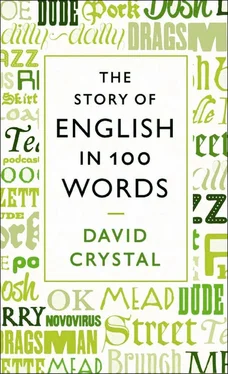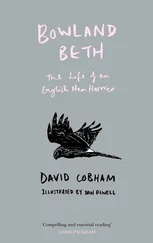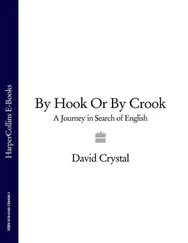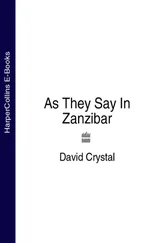However, the trend seems to be slowing down. Very few 21st-century new words in English have so far been borrowings. Vuvuzela is a South African example from 2010, but it took an event of World Cup proportions to introduce it. Does this reflect a new national concern over identity?
 97. Muggle — a fiction word (21st century)
97. Muggle — a fiction word (21st century)
Much of the new vocabulary in 21st-century English reflects the major social changes and events that have taken place in the real world. New editions of dictionaries in the 2000s have included such expressions as social media, congestion charge, designer baby, flash mob, toxic debt, quantitative easing, geoengineering, WMDs (‘weapons of mass destruction’) and wardrobe malfunction . More interesting, because more unexpected, are the words that have come from the world of fiction.
J. K. Rowling coined muggle in her first Harry Potter novel (1997) for a person who possesses no magical powers — adapting the associations of mug in the sense of ‘foolish or incompetent person’ and somehow neatly bypassing its earlier senses. Nobody would have linked it to the 13th-century use of muggle meaning ‘fish-like tail’ or the 17th-century use meaning ‘sweetheart’, but I’m surprised it survived the sense of ‘marijuana’ in American street slang, which had been around for most of the 20th century. Marijuana addicts were mugglers . It didn’t seem to matter, as the power of the Harry Potter series grew.
By the turn of the millennium, the word had travelled well beyond the books and films. A muggle in the 2000s is any person thought to lack a particular skill. Some people use it in the same way as its source word, mug , and there are similarities too with the way muppet (a term popularised in the 1970s by Jim Henson) has left puppetry behind to mean — usually as an affectionate tease — an ‘idiotic or inept person’.
An unexpected development arose in the high-tech treasure-hunting game known as geocaching , devised in 2000, where people who don’t know the game or who interfere with it in some way are described as muggles . Adventurers equipped with a GPS system try to locate hidden containers ( geocaches ) around the world, using geographic co-ordinates registered on the geocaching web site. If a geocache has been vandalised or stolen, it’s said to have been muggled .
Films have introduced hundreds of catch-phrases into English, such as Make my day! and May the Force be with you . Only occasionally, as we saw with matrix ( §37), have they also provided new words, or new senses of old words. Muggle is one of those cases. And since 2000 we should also give due recognition to Winnie-the-Pooh , which has popularised tiggerish (‘very lively, cheerily energetic’), Austin Powers , which has introduced us to mini-me (‘a person closely resembling a smaller version of another’) and Meet the Fockers , for fockerise (‘to introduce comedic chaos of the kind displayed in the film’).
Television advertising has also been a rich source of catch-phrases and the occasional new word or sense, though these rarely travel outside the countries where an ad is shown. Pinta (‘pint of milk’) entered British English in the late 1950s because of its use in the television jingle Drinka pinta milka day . And in the 2000s we find va-va-voom , used as an expression of admiration since the 1950s, but not widely known until it became the theme of a series of UK television commercials for Renault cars, starring footballer Thierry Henry, in which he tried to track down its real meaning. ‘Look,’ he says apologetically in one of the ads, ‘I don’t make the words.’ But without him, I doubt if we would now have its latest meaning: ‘the quality of being exciting, vigorous or attractive’.
 98. Chillax — a fashionable blend (21st century)
98. Chillax — a fashionable blend (21st century)
This combination of chill (in its ‘calm down’ sense) and relax arrived in the early 2000s — a coinage which has come to be loved and hated in about equal proportions. By 2010 it had become a newsworthy headline. A piece by Simon Hoggart in The Independent for 23rd February began: ‘ Chillax man — or Gordon will get you ’ — apparently referring to the then prime minister’s use of the word while telling his advisers not to panic. If Gordon had been really cool, of course, he would have used the derived expression: Chillax to the max .
This is one of the latest blends, or portmanteau words — a technique of word creation ( §67) that has become extremely popular in the 21st century. Chillax is gradually building up a word family of its own: already we have chillaxing and chillaxed . Podcast — a blend of iPod and broadcast — is even more productive: first used in 2004, it’s now found as a noun ( a podcast ), a verb ( to podcast ), an adjective ( a podcast experience ) and in several derived forms ( podcasting, podcasters, a podcasted show ).
Dozens of new blends are around now: have you seen a threequel (a ‘second sequel’), eaten turducken (‘a combination of roast chicken, duck and turkey’), read about a bromance (‘affection between two men’), taken a staycation (‘vacation staying at home, or in one’s home country’) or daycation (‘a day-long holiday’) or used a freemium (‘an internet business model in which basic features are free but advanced features are not’)? You may have frenemies (‘people with whom you remain friendly, despite some sort of dislike’). You will certainly know some screenagers (‘teens who have an aptitude for computers and the internet’).
And what about jeggings ? These are leggings designed to look like tight-fitting jeans, a blend of jeans + leggings , and one of the most fashionable clothing developments of 2010. The word family here is growing: meggings (‘men + leggings’), treggings (‘trousers + leggings’). It seems to be a trend within the fashion industry to mix different types of clothing, and the language is desperately trying to keep up. Have you worn a coatigan (‘coat + cardigan’), shacket (‘shirt + jacket’), skorts (‘skirt + shorts’) or tankini (‘tank top + bikini’)? Or a mankini (‘man + bikini’, male skimpy swimwear such as that used by the film character Borat)? Then there are blurts (‘blouse + skirt’), cardigowns (‘cardigan + dressing gown’), mackets (‘mac + jacket’), shoots (‘shoe + boot’) and skousers (‘skirt + trousers’). I sometimes wonder which came first — the design or the word?
 99. Unfriend — a new age (21st century)
99. Unfriend — a new age (21st century)
In 2009 the New Oxford American Dictionary chose unfriend as its ‘Word of the Year’. It meant ‘to remove someone from a list of contacts on a social networking site such as Facebook’. A minor controversy followed. Some argued that the verb should be defriend . But the use of un- was already well established in the terminology of reversing computer actions, with undo, unerase, undelete, unbold and many more. As a New York Times article said in 2009 (15th September), we are living in an ‘Age of Undoing’.
Читать дальше

 97. Muggle — a fiction word (21st century)
97. Muggle — a fiction word (21st century) 98. Chillax — a fashionable blend (21st century)
98. Chillax — a fashionable blend (21st century) 99. Unfriend — a new age (21st century)
99. Unfriend — a new age (21st century)










